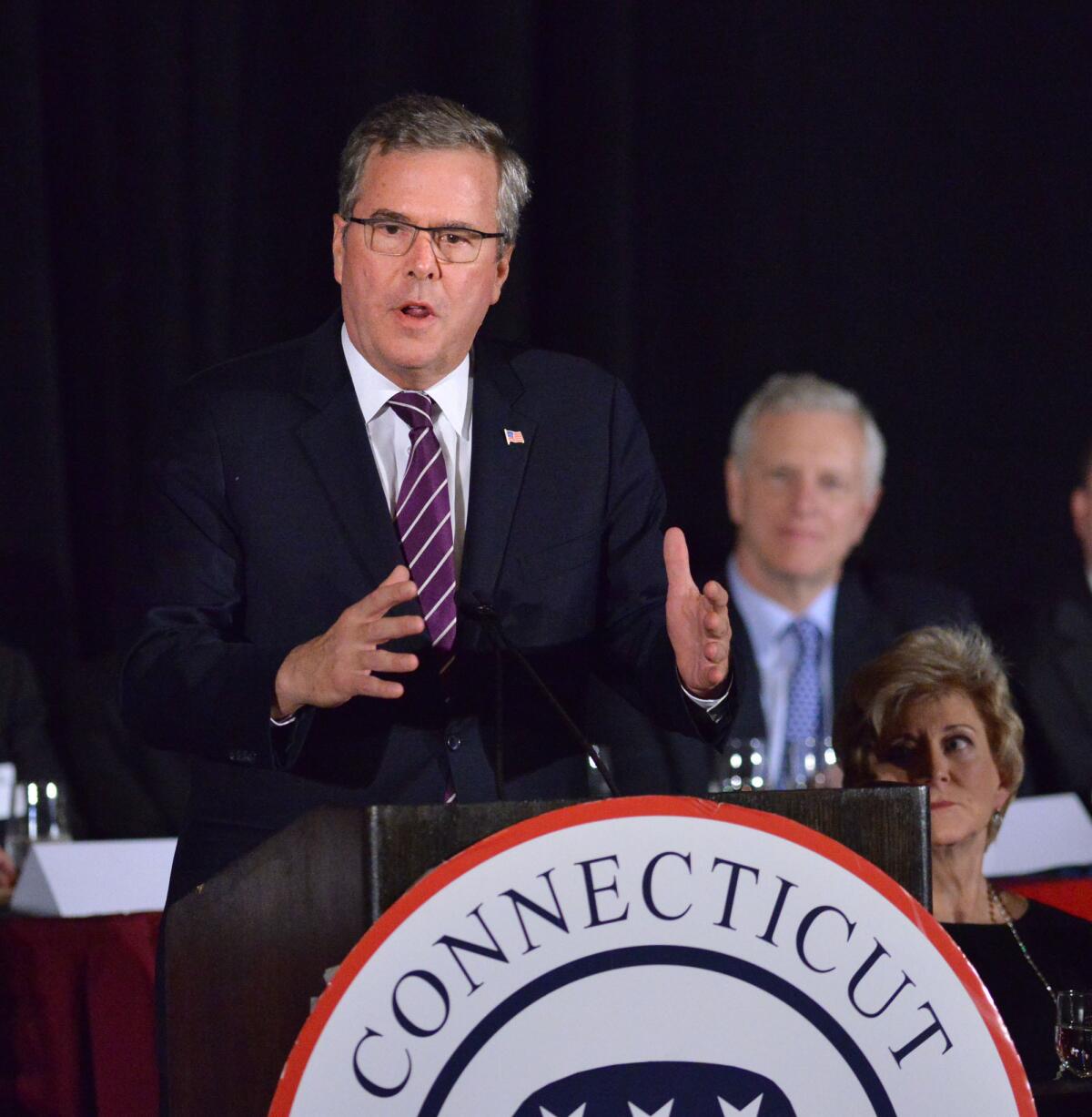Op-Ed: Is Jeb Bush too old school for the new GOP?

- Share via
Is Jeb Bush’s moment over?
Not in his mind. The former governor of Florida says he’s considering a campaign to become his family’s third president, even though he dreads “getting back into the vortex of the mud fight.”
But as enticing as it is for the Republican establishment to contemplate the prospect of an unexpected comeback, an epic series of primary battles and a cinematic rematch between the Clinton and Bush dynasties, it’s not all that likely.
The Republican Party has changed dramatically since 2002, the last year Jeb Bush ran for office, and not in ways that would aid his candidacy.
Let’s start with Bush’s presumed base of support: the moderate-to-conservative Republican establishment, based in the business community and the donor class. Yes, some of the grandees would like to see the comforting name of Bush atop their party’s ticket again — but not all of them. Many believe that what their party needs in 2016 is a new face, and Bush isn’t that.
“He’s a fine man, but the disadvantages outweigh the advantages,” one thoroughly establishment figure, a former fundraiser for George W. Bush, told me. “The Republican Party is about to turn the page generationally. We need to be looking forward, not back.”
It’s not only a matter of image, he said, but something more fundamental. “He’s out of sync with where the party has gone. This is a party of small government and individual freedom now. Jeb comes from the 1990s, from a generation of governors who mostly wanted to make government more efficient.”
In 2012, Mitt Romney wasn’t his party’s clear first choice either. Romney won the Republican nomination only after he outlasted a series of impromptu conservative challengers: Newt Gingrich, Rick Santorum, Rick Perry, former pizza magnate Herman Cain.
But those other candidates were all underqualified or underprepared. This time, the GOP’s conservative wing has a bench full of potential candidates who have spent years raising money, recruiting supporters and honing messages: Sens. Marco Rubio, Rand Paul and Ted Cruz, Rep. Paul D. Ryan, Wisconsin Gov. Scott Walker. There’s no pushover on that list.
Finally, if Bush decides to run for the nomination, he’s chosen an unusual way to do it: poking his finger in the eyes of conservative activists on hot-button issues.
His compassionate statement on illegal immigrants — “It’s an act of love” — got headlines this month.
But that wasn’t as jarring to many conservatives as Bush’s flinty defense of Common Core, the national standards for elementary school education. Tea party activists loathe the program as “Obama-core” and see it as an attempt to impose federal control on local schools (even though it originated with governors like Bush when Barack Obama was still in the Illinois state Senate).
Bush waves their concerns aside with an air of impatient disdain. “The idea that it’s a federal program is just not true,” he told Fox News this month. “I’m totally committed to this…. I just don’t feel compelled to run for cover when I think this is the right thing to do for our country.”
Give the man credit for sticking to his guns. When Romney ran into flak from the right, he changed his positions. Bush’s stubborn fidelity to his convictions, by contrast, is admirable. But he’s somehow allowed it to crowd out any other message.
“If you’re running for president, talking about stuff your base doesn’t want to hear is not a surefire way to win,” observed John Feehery, a former aide to the Republican House leadership. “Talk about something else instead.”
Bush isn’t doing that, which, to some Republicans, is one of many signs that he’s not ready for a presidential run yet.
Another is his frequent and candid invocation of ambivalence about running, not normally a sought-after emotion in a party’s electoral champion.
“I go about my business each day trying to avoid having to think about it,” he told Fox News. “I’ve got a fulfilled life.”
A candidate named Bush has additional reason to hesitate. If Jeb runs, one of his first challenges will be to explain how he differs from his father, whom many Republicans remember chiefly for raising taxes, and his brother, who led the country into two wars and a financial crash. If his rivals don’t ask him which of the other Bushes’ decisions he disagreed with, reporters will. That’s how you’ll know he’s really decided to run: when he agrees to answer those unpleasant questions.
It’s not impossible that Jeb Bush could win his party’s nomination in 2016. It would take a decision to run, a clear and visionary message, hard work organizing supporters and raising money, and a grueling gantlet of primaries against — if he’s lucky — divided conservative opposition. But so far, Bush hasn’t stepped onto that well-marked path.
That doesn’t mean he won’t. That GOP grandee I quoted? He demanded anonymity — because he knows he just might end up working for the candidate he criticized.
Twitter: @DoyleMcManus
More to Read
A cure for the common opinion
Get thought-provoking perspectives with our weekly newsletter.
You may occasionally receive promotional content from the Los Angeles Times.











